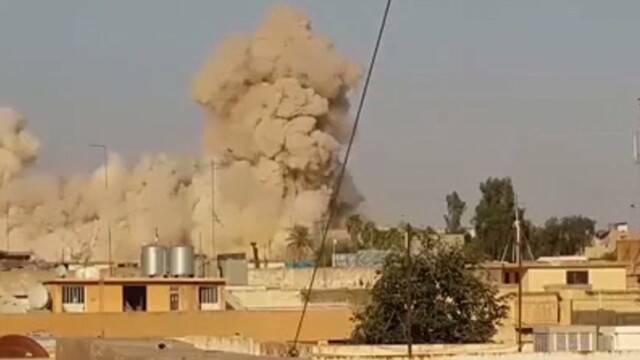Buried in the depths of a great fish, caught in the darkness of the sea and perhaps never to see the light of day again, the Prophet Jonah cried out: “Out of my distress I called to the Lord, and He answered me; From the midst of the netherworld I cried for help, and You heard my voice” (2:3). Jonah was shortly thereafter cast out of the fish and went on to preach to and save the Ninevites. Folklore tells us that Jonah, after growing into old age, died and was interred in the city of Mosul in Iraq. Last Thursday (7/24), militant Sunni’s who identify with the radical group ISIS (The Islamic State in Iraq and of the Levant) detonated several charges in the mosque containing the tomb of Jonah, citing it as an unholy place desecrated by apostates and non-believers. The prophet, who was refused by the fish after being cast out by man, was again buried in the depths of darkness.
In the past month we have seen parts of Iraq and Syria cast into the darkness under the brutal assault of ISIS. According to a United Nations Daily News Report (7/7), “June was the deadliest month in the country (Iraq) since 2007 with the insurgency claiming some 2,400 lives—more than half of them civilians.” An earlier United Nations Daily News Report (7/2), notes the dire situation in which ISIS has placed a number of Iraqi’s, especially women: “An estimated 20,000 women and girls in Iraq are at an increased risk of sexual violence as a result of the mounting crisis in the north and west.” The report states that, just in June, 2.2 million Iraqi’s had been displaced from their homes.
There has been little tolerance for the Christian communities in Iraq. The City of Mosul is nearly empty of Christians for the first time in over 1,000 years; ISIS has issued an ultimatum to the Iraqi Christian community, which is entering into diaspora rather rapidly, stating that they must either convert, pay a tax, leave the "Caliphate" or die; and many Christians have already been tortured and publicly executed.
“Although ISIS has increased the Christian exodus, it did not initiate it," The New York Times reported on July 23. "Since the Americans invaded Iraq in 2003, attacks and purges by other extremist groups have also contributed to the Christian community’s decline. Before the invasion, there were about 1.2 million Christians in the country; the current estimate is no more than 500,000, and that number could shrink to 50,000 in a decade, according to Louis Sako, patriarch of the Chaldean Catholic Church in Baghdad.”
Patriarch Sako further commented in an interview with Vatican Radio that “the situation in Iraq is dire not only for Christians, but for all ethnic groups, including for Muslims. A mosque was recently destroyed in Nineveh. The danger, he said, extends to the whole world. The ISIS militia has a very strong ideology, which makes negotiations difficult.”
That is the root of the issue: ideology. At this point, it is not theological or practical, but a deeply-rooted and rabid ideology that seeks its own prosperity.
One of the most notable and dangerous characteristics of a militant group is that it purposefully destroys cultural symbols and religious icons in the name of its’ own prosperity. We've seen this before: during the Second World War the Third Reich’s attempted to collect and/or destroy large collections of art and signifiers of various cultural heritages. The Nazi regime sought the total extermination of not just a people, but of a society and a culture.
Today, through scare tactics, brutal enforcements of Shari’a law and the destruction of Christian and Muslim shrines, ISIS is attempting to destroy what makes Iraqi individuals a community. It is attempting to deprive them of their tradition and history, justifying their goals in the name of religion. In fact, their goals and actions, so clearly different from those of the majority of Muslims, are anything but religious. They are not acting in the name of Allah, but rather in the name of man. They choose the Shari’a laws that suit them best and apply them to their means and sought-after end goals. They’ve ignored more than half of the articles in The Universal Declaration of Human Rights (28 out of 30, actually) and hold the governments of Iraq and Syria in utter contempt.
Any organization, so focused on its own ideological ends, can only be destructive, as history has repeatedly shown. While I am certainly not a proponent of relativism in the philosophical sense, I do believe that a society cannot prosper unless it allows members to follow their own consciences without violating the rights of other individuals. ISIS is more than willing to exercise their own rights and abilities, but they are not willing to allow other views to exist. ISIS must recognize that if their ideology cannot stand on its own without the aid of a rubber truncheon and a gun, than it should not be exercised.
The systematic slaughter of men, women and children, the suppression of basic human rights and the total destruction of a way of life are sad realities that have followed us into the 21st century. The actions undertaken by ISIS are those of men motivated by the pursuit of power, not faithfulness. If we are to be different from them, rooted in a true personhood that allows all people to identify with their consciences, understanding that all life is valued before God, than we must not only act to assist the victims of ISIS, but we must seek justice for the perpetrators of these atrocities. Let us pray that the world answers the cries of the Iraqi people, and that God hears their voices from "the netherworld."
Nicholas D. Sawicki is a former intern at America.








